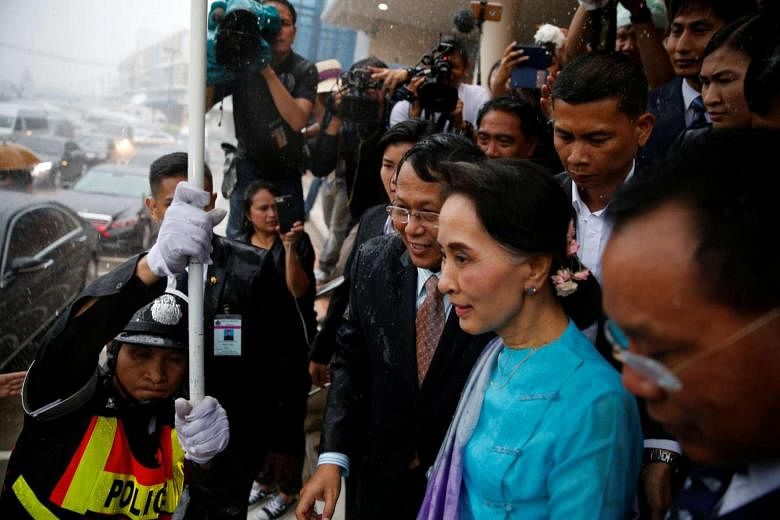BANGKOK (Bloomberg/AFP) - Myanmar's State Counsellor Aung San Suu Kyi official visit to Thailand for to meet the ruling junta has drawn criticism both for its symbolism and the heavy restrictions surrounding it.
Thousands of Myanmar migrant workers hoping to see their country's de facto leader speak at a Thai fishing town on Thursday (June 23) were barred from accessing the site, Mr Andy Hall, an activist with the Migrant Worker Rights Network, said from the event in Samut Sakhon province. Ms Suu Kyi had visited the same area in 2012 as her nation's opposition leader and promised to return once her party won elections, which it did last year.
"She said she would come back as the leader and she would change their lives," Mr Hall said, noting that not getting to see Ms Suu Kyi would be a huge disappointment. "It's the promise that she made many years ago, so she's coming back to live this promise today."
Ms Suu Kyi arrived on Thursday to a frenzied welcome from some of the hundreds of thousands of her compatriots who have sought work and sanctuary from war across the border.
Thai police struggled to hold back a boisterous thousands-strong crowd of migrant workers, many holding aloft framed photos of the nation's star politician while chanting "Mother Suu, Mother Suu".
Although cocooned by security guards, crowds craned to grab a fleeting glimpse of a politician who strides over Myanmar's democracy movement and exerts a powerful moral force among her countrymen wherever they are.
"I am so happy, I love Aung San Suu Kyi... today is the first time I have seen her," said 32-year-old Mr Banyar Taik, who works at a tuna processing plant.
Ms Suu Kyi, who is Myanmar's de facto leader despite being barred from the presidency, vowed to support migrants in discussions during her three-day trip.
"I want to hear the voices from our nationals. Please speak openly about we can do for you and what you expect," she said.
But she did not field questions from reporters in keeping with the tight control she has exerted over political messaging since her party took power in April.
Ms Suu Kyi enjoys a peerless status to many Myanmar people who see her as symbol of defiance through the dark junta years and a beacon of hope.
Her visit "fills me with hope", Myanmar migrant Thon Barami, 50, told AFP at the scruffy port, which is a hub for Thailand's huge seafood industry and home to more than 100,000 low-paid Myanmar labourers.
"We have problems here in Thailand. She might help us with labour rights... people all around the world will listen to her," she added.
Ms Suu Kyi, who holds several positions in Myanmar's government including foreign minister, is visiting military-ruled Thailand in her capacity as state counsellor, a post created to get around a constitutional ban on her becoming president.
She is expected to sign accords on labour and border crossings during her three-day visit to Thailand, Myanmar's largest trading partner after China with total trade last year valued at US$8.1 billion and home to millions of Myanmar migrants.
Ms Suu Kyi, whose party took power in April after defeating the long-ruling military in elections last year, has come under greater scrutiny as she makes the transition from democracy hero to politician.
She has been criticised for having an autocratic leadership style as well as not being vocal enough about rights issues, particularly the plight of stateless Rohingya Muslims and other minorities at home.
Earlier on Thursday, the Thai authorities stopped a Rohingya group from holding a news conference at the Foreign Correspondents Club of Thailand, though they released a statement critical of Ms Suu Kyi.
News coverage of her visit has been tightly restricted, with few events open to the press. The media will not be allowed to listen to a speech she will give on Friday to Thai university students, though Thailand's Ministry of Foreign Affairs has offered to summarise it once it is finished.
What the ministry has deemed a joint "press conference" between Ms Suu Kyi and Thai junta leader Prayut Chan-Ocha on Friday will also have limited access and no questions will be allowed.
Ms Suu Kyi had been scheduled to visit a camp that is home to Myanmar refugees on Saturday, though late on Wednesday, Thai officials said the trip had been cancelled "due to adverse weather conditions."
They said her new agenda for Saturday was a "private programme".


